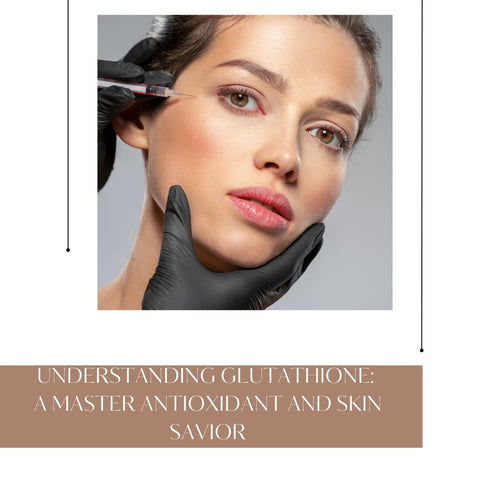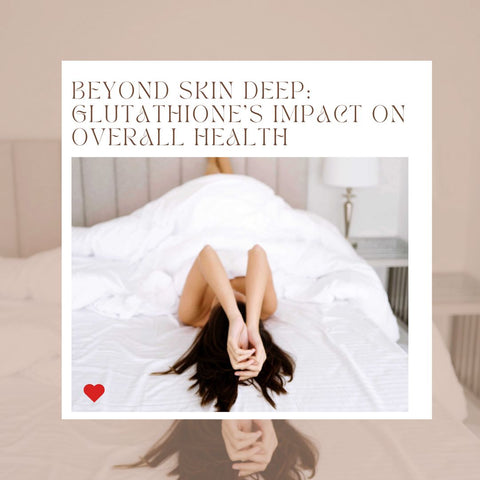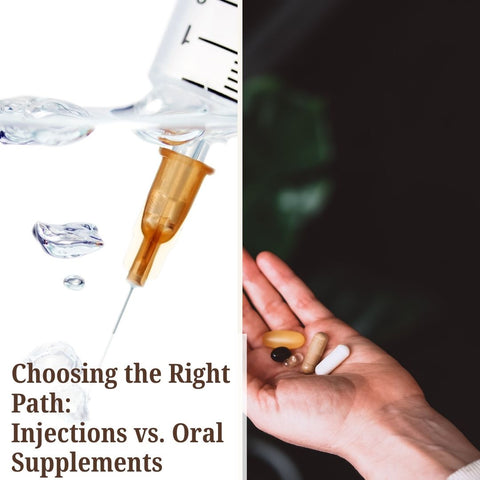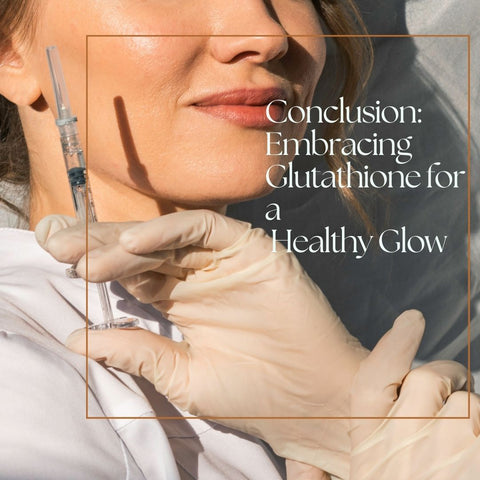Glutathione injections have grown in popularity due to their potential skin advantages, despite insufficient scientific data supporting their usefulness. Glutathione is an antioxidant that the body naturally produces and can be found in a variety of foods. It is essential for shielding cells from oxidative damage and maintaining immunological function. While oral glutathione supplements are available, some people prefer glutathione injections due to potential skin lightening effects and other perceived benefits. However, it is important to highlight that the use of glutathione injections for skin whitening or other cosmetic goals is debatable and not without risk.
Understanding Glutathione: A Master Antioxidant and Skin Savior

Glutathione, also known as the "master antioxidant," is a naturally occurring chemical found in all cells of the human body. It is necessary for sustaining good health since it plays an important part in many physiological processes. Glutathione's antioxidant capabilities make it an effective defence against oxidative stress, which is linked to a variety of diseases and ageing processes. This blog takes a closer look at glutathione and its role in skincare and overall wellness.
The Role of Glutathione in Skin Lightening and Radiance
Glutathione has received attention for its potential to lighten skin and promote radiance. While scientific evidence supporting its efficacy for these purposes is limited and controversial, some people take glutathione supplements or receive intravenous (IV) injections in the hopes of improving their skin complexion and luminosity. Here's an overview of glutathione's alleged role in skin lightening and radiance.
-
Inhibition of Melanin Production: Glutathione is thought to lighten the skin by inhibiting the activity of tyrosinase, an enzyme involved in melanin synthesis. Melanin is the pigment responsible for skin colour, and inhibiting its production can result in a lighter complexion. By interfering with the conversion of tyrosine into melanin, glutathione may help reduce the formation of hyperpigmentation, dark spots, and uneven skin tone.
-
Antioxidant Properties: As a powerful antioxidant, glutathione combats oxidative stress and neutralises free radicals, which can contribute to skin damage and ageing. By protecting skin cells from oxidative damage, glutathione may contribute to a brighter and more radiant complexion. Oxidative stress can lead to the accumulation of melanin and the formation of age spots, dullness, and uneven texture. Glutathione's antioxidant properties may help address these concerns by promoting healthier-looking skin.
-
Detoxification and Skin Health: Glutathione is essential in detoxification processes, helping to remove toxins, contaminants, and metabolic wastes from the body. Glutathione, which supports detoxification processes, may help enhance overall skin health and brightness. Glutathione may indirectly contribute to a brighter, more luminous complexion by lowering toxic levels and supporting cellular health.
-
Immune Support: Glutathione is critical for sustaining proper immunological function and response. A robust immune system is essential for skin health because it protects against infections, inflammation, and environmental stresses that can alter skin appearance. Glutathione, which supports immunological function, may help protect the skin from external harm and create a more luminous complexion.
Glutathione and Antioxidant Properties: Shielding Your Skin"
Glutathione protects the skin from oxidative damage, aids in repair and regeneration, and promotes a brighter, more radiant complexion. Incorporating antioxidant-rich foods, skincare products, or supplements into your daily regimen will help boost glutathione levels and improve overall skin health. However, it is critical to speak with a healthcare expert before beginning any new supplement programme.
Exploring the Side Effects: What You Need to Be Aware Of

While glutathione is generally regarded as safe when taken at adequate levels, there are certain potential adverse effects to be aware of, particularly when utilising high doses or receiving intravenous (IV) glutathione injections. Some important factors to consider include allergic responses, injection site reactions, electrolyte imbalances, kidney and liver function, skin-lightening concerns, drug interactions, gastrointestinal disturbances, and long-term safety.
Potential Side Effects of Glutathione Injections
Glutathione injections, while sometimes used for their purported skin-lightening effects and other purposes, can have serious side effects and risks. Here are some possible side effects of glutathione injections:
-
Injection Site Reactions: Glutathione injections can result in localised reactions such as pain, redness, swelling, or bruising. These reactions are usually mild and temporary, but they can be bothersome for some people.
-
Allergic Reactions: Some people may have allergic reactions to glutathione injections, which can include rash, itching, hives, swelling, or difficulty breathing. Allergic reactions can range in severity and require immediate medical attention.
-
Skin Discoloration or Hyperpigmentation: Long-term use of glutathione injections for skin lightening can result in unintended skin discoloration, uneven pigmentation, or hyperpigmentation. The effects of glutathione on skin pigmentation are not well understood, and long-term use may have unpredictable results.
-
Kidney and Liver Function: The kidneys and liver metabolise and excrete glutathione. High doses of glutathione injections may put a strain on these organs, possibly impairing kidney and liver function. Individuals with pre-existing kidney or liver conditions should take glutathione injections with caution and under medical supervision.
-
Electrolyte Imbalance: Excessive use of glutathione injections can disrupt the body's electrolyte balance, resulting in sodium, potassium, calcium, and other mineral imbalances. Electrolyte imbalances can result in symptoms like weakness, dizziness, confusion, or irregular heartbeats.
-
Infection Risk: Any injection increases the risk of infection at the injection site. To reduce the risk of infection, glutathione injections should be administered sterilely and in a medical setting.
-
Blood Pressure Changes: Glutathione injections may cause blood pressure fluctuations, particularly in people who have pre-existing hypertension or cardiovascular disease. It is recommended to monitor blood pressure levels regularly when using glutathione injections.
-
Drug Interactions: Glutathione injections can interact with certain medications, such as chemotherapy, anti-seizure medications, and immunosuppressants. Before receiving glutathione injections, you should consult with a healthcare professional, especially if you are currently taking any medications.
-
Long-Term Safety Concerns: The long-term safety of glutathione injections, particularly for cosmetic purposes like skin lightening, has not been established. More research is needed to determine the risks and benefits of long-term glutathione injection therapy.
Safety Measures for Glutathione Supplementation
When contemplating glutathione supplementation, it's critical to prioritise safety and take the necessary precautions to reduce any dangers. When using glutathione supplements, it is important to consult with a healthcare professional, choose reputable brands, follow recommended dosages, monitor for side effects, consider individual needs, assess potential interactions, monitor health parameters, incorporate a variety of antioxidant sources, and avoid self-diagnoses and treatments. By following these precautions and consulting with a healthcare practitioner, you can make informed glutathione supplementation selections that will benefit your overall health and well-being.
The Journey to Beautiful Skin: Using Glutathione Wisely

Understanding glutathione's potential benefits, risks, and limitations is necessary for proper use in your skincare routine. While glutathione supplements or treatments may improve the appearance of some people's skin, they should be used with caution and responsibility. Here are some tips for wisely incorporating glutathione into your skincare regimen: Consult with a dermatologist or healthcare professional, understand potential benefits and risks, choose the right formulation, follow recommended dosages, be patient and consistent, monitor for side effects, combine with healthy lifestyle habits, consider alternatives, and reassess and adjust regularly. By using glutathione wisely and in conjunction with professional advice, healthy lifestyle habits, and complementary skincare practices, you can effectively and responsibly support your journey to beautiful, radiant skin.
Optimal Dosage and Administration of Glutathione
The optimal glutathione dosage and administration are determined by a variety of factors, including individual health status, skin concerns, and treatment goals. Here are some general guidelines for dosage and administration:
-
Oral Glutathione Supplements: Oral glutathione supplements are available in capsule, tablet, and liquid forms. However, the efficacy of oral glutathione supplements is being questioned due to concerns about poor absorption in the gastrointestinal tract. The usual daily dosage range for oral supplements is 250–1000 mg. Starting at a lower dose, gradually increase it based on each person's response and tolerance. Take oral glutathione supplements on an empty stomach, preferably in the morning or between meals, to maximise absorption. Avoid consuming them with foods or beverages that may interfere with absorption, such as dairy products or coffee.
-
Topical Glutathione Products: Topical glutathione products, like creams, serums, and lotions, are applied directly to the skin. While topical application allows for localised glutathione delivery to the skin, it may be less effective than systemic administration. Follow the manufacturer's instructions for applying topical glutathione products. Apply a thin layer of the product to clean, dry skin and gently massage until fully absorbed.
-
Intravenous (IV) Glutathione Injections: Intravenous glutathione injections deliver glutathione directly into the bloodstream, bypassing the digestive system for faster absorption and distribution throughout the body. The optimal dose of IV glutathione injections varies according to weight, health status, and treatment goals. Dosages are typically between 600 mg and 2400 mg per session, administered 1-3 times per week. IV glutathione injections should be given by a qualified healthcare professional in a clinical setting using sterile techniques to reduce the risk of infection and other complications.
-
Combination Therapies: Some people may combine glutathione supplements or treatments with other skin-lightening agents, antioxidants, or cosmetic procedures to improve their results. However, the safety and efficacy of combination therapies should be thoroughly evaluated, and professional advice is recommended.
-
Monitoring and Adjustment: Regardless of the method of administration, it is critical to monitor your skin's response and overall health when using glutathione supplements or treatments. Regularly reassess your dosage, administration method, and treatment regimen based on individual needs and feedback from a healthcare professional.
-
Consultation With a Healthcare Professional: Before beginning any glutathione supplementation or treatment regimen, speak with a qualified healthcare professional, such as a dermatologist or physician. They can make personalised recommendations based on your specific requirements, health status, and treatment objectives.
Skin Rejuvenation and Glowing Complexion with Glutathione
Glutathione is frequently promoted for its ability to stimulate skin renewal and produce a bright appearance. While scientific evidence for its efficacy in these applications is sparse and contentious, some people report changes in skin tone, luminosity, and general look after taking glutathione supplements or therapies.
Glutathione for Hyperpigmentation: Brighten Uneven Skin Tone
Glutathione has received attention for its ability to reduce hyperpigmentation and improve uneven skin tone. While scientific evidence for its efficacy in these applications is sparse and contentious, some people report improved skin tone and pigmentation after taking glutathione supplements or therapies. Glutathione may help address hyperpigmentation and uneven skin tone by inhibiting melanin synthesis, providing antioxidant protection, detoxifying and improving skin clarity, increasing skin brightness, supporting collagen production, and improving skin texture. While glutathione supplements or therapies may help with hyperpigmentation and uneven skin tone, individual reactions may differ.
Beyond Skin Deep: Glutathione's Impact on Overall Health

Aside from its possible impacts on skin health and appearance, glutathione is essential for sustaining general health and well-being. Glutathione, the body's master antioxidant and a vital actor in different physiological processes, has a wide-ranging impact on health beyond the skin. Here's how glutathione affects overall health, including antioxidant defence, immunological function, detoxification, cellular repair and regeneration, energy production, neurological and cardiovascular health, and ageing and lifespan.
Boosting Your Immune System with Glutathione
Glutathione is essential for maintaining immune function and boosting the body's natural defence mechanisms. As the body's master antioxidant and a key regulator of immune responses, glutathione influences various aspects of immune health. This is the way that glutathione strengthens the immune system:
-
Glutathione is an effective antioxidant, helping to neutralise free radicals and oxidative stress, which can harm immune cells and impair immune function. By protecting immune cells from oxidative damage, glutathione supports their optimal function and enhances immune responsiveness.
-
Natural killer (NK) cells, macrophages, and lymphocytes are immune cells whose activity is regulated by glutathione. To maintain a balanced and efficient immune response to infections and foreign invaders, it helps regulate immune cell proliferation, differentiation, and function.
-
Glutathione modulates the production of pro-inflammatory cytokines and chemokines, which helps control inflammatory responses. It prevents excessive inflammation, which can lead to tissue damage and autoimmune disorders, by balancing pro- and anti-inflammatory signals and preserving immune homeostasis.
-
Glutathione promotes the activity of other antioxidant enzymes, including superoxide dismutase (SOD) and catalase, which are critical in protecting immune cells from oxidative damage. By improving the function of these antioxidant enzymes, glutathione reinforces the body's antioxidant defence system and boosts immune resilience.
-
Glutathione is involved in detoxification processes, which help remove toxins, pollutants, and metabolic byproducts that can impair immune function. By supporting detoxification pathways in the liver and other organs, glutathione helps optimize immune health and resilience against environmental stressors.
-
Glutathione protects against infections by enhancing immune cells' ability to recognise and eliminate pathogens such as bacteria, viruses, and fungi. It helps immune cells involved in innate and adaptive immunity function properly, allowing for an effective immune response to invading pathogens.
-
Glutathione promotes immune system balance and tolerance, preventing excessive immune activation that can result in allergies, autoimmune diseases, or chronic inflammation. By modulating immune responses, glutathione promotes immune system balance and overall health.
-
Glutathione promotes immune resilience and adaptation to environmental challenges such as stress, infections, and toxins. It improves immune responses to changing conditions and increases overall immune system robustness and effectiveness.
Glutathione and Liver Health: Detoxify Your Body
Glutathione supports liver health and detoxification activities in the body. Glutathione, the principal antioxidant and detoxifying agent produced by the liver, helps neutralise toxins, pollutants, and metabolic wastes, allowing them to be eliminated from the body more easily. Here's how glutathione promotes liver health and detoxification: detoxification pathways, neutralisation of reactive oxygen species (ros), protection against liver damage, support for liver regeneration, modulation of inflammatory responses, liver disease protection, drug and toxin metabolism, and antioxidant synergy. Individuals can boost liver health and optimise detoxification processes by promoting glutathione production through dietary and lifestyle measures such as eating sulfur-rich foods, getting enough vital nutrients, and limiting their exposure to toxins and pollutants. Furthermore, consulting with a healthcare professional can provide personalised advice on how to improve liver health and detoxification through dietary, lifestyle, and supplementation changes.
Choosing the Right Path: Injections vs. Oral Supplements

When it comes to glutathione supplementation, people often have to choose between injections and oral supplements. Both methods of administration have advantages and disadvantages, and the choice is influenced by factors such as personal preferences, treatment objectives, and medical concerns. To help you make the right decision, here's a comparison of glutathione injections and oral supplements:
-
Glutathione injections, such as direct delivery, potency, professional administration, treatment of specific conditions, cost, and accessibility.
-
Glutathione oral supplements have advantages such as convenience, availability, gradual absorption, cost-effectiveness, and supportive therapy.
Comparing Glutathione Injections and Oral Supplementation
When deciding between glutathione injections and oral supplementation, weigh the benefits, drawbacks, and suitability for your specific needs. Here's a comparison between glutathione injections and oral supplements:
Glutathione Injections:
-
Glutathione injections introduce the compound directly into the bloodstream, resulting in rapid absorption and high bioavailability. This makes glutathione immediately available to cells and tissues throughout the body.
-
Glutathione injections typically contain higher levels of glutathione than oral supplements. This could be beneficial for people who need intensive or targeted glutathione therapy, such as those with specific medical conditions or treatment goals.
-
Healthcare professionals administer glutathione injections, ensuring proper dosing, sterility, and safety. This provides reassurance to people looking for medical supervision and expertise.
-
Glutathione injections are occasionally used for therapeutic purposes, such as the treatment of specific medical conditions or as an adjunctive therapy in integrative medicine. They may be recommended for people with specific health issues or treatment requirements.
Glutathione Oral Supplementation:
-
Glutathione oral supplements are convenient and simple to use, requiring no additional equipment or physician supervision. They may be used at home or on the road, providing flexibility and convenience for people with hectic schedules.
-
Glutathione oral supplements are readily available over the counter and online, making them accessible to a diverse spectrum of people. They are available in a variety of formulations, including capsules, tablets, liquids, and powders, allowing for individualization based on preferences.
-
Oral glutathione supplements are digested and absorbed in the gastrointestinal tract, which results in slower and more gradual increases in circulating glutathione levels than injections. However, consistent dosage over the years may result in considerable cumulative effects.
Consulting a Professional for Glutathione Skin Therapy
When considering glutathione skin therapy, it is highly suggested that you speak with a qualified healthcare expert, such as a dermatologist or integrative medicine specialist. Assessment of skin issues, personalised treatment plans, monitoring and follow-up, resolving safety concerns, integration with other therapies, education and guidance, and monitoring for side effects are all important reasons to seek expert advice. By consulting with a skilled healthcare expert before commencing glutathione skin therapy, you may assure safe and effective treatment outcomes, receive tailored guidance and support, and make informed decisions about your skincare regimen. Your healthcare practitioner can provide expert advice and guide you through the complexity of glutathione therapy, allowing you to reach your skin goals while also prioritising your overall health and well-being.
Conclusion: Embracing Glutathione for a Healthy Glow

Embracing glutathione for a healthy glow can be an effective way to improve skin health, promote general well-being, and achieve a bright complexion. Glutathione, the body's master antioxidant and a major actor in detoxification processes, has significant benefits for skin renewal, hyperpigmentation, and immunological function. Glutathione's antioxidant qualities help neutralise free radicals, protect against oxidative stress, and maintain cellular integrity, resulting in a more youthful appearance and better skin texture. Furthermore, glutathione's ability to prevent melanin formation can help reduce hyperpigmentation, black spots, and uneven skin tone, resulting in a brighter, more even complexion.
Glutathione therapy, whether administered orally, topically, or intravenously, provides a variety of choices for people looking to improve the radiance and vitality of their skin. You must consult with a trained healthcare expert to identify the best treatment plan for your specific needs, preferences, and medical concerns. You can maximise the advantages of glutathione and generate a healthy glow from the inside by including it in your skincare routine and following healthy lifestyle behaviours such as eating a balanced diet, staying hydrated, controlling stress, and protecting your skin from sun damage.









































